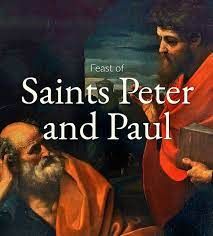The history of Saints Peter and Paul shows us that the communion to which the Lord calls us is a unison of voices and personalities that does not eliminate anyone’s freedom. Our patron saints followed different paths, had different ideas and at times argued with one another with evangelical frankness. Yet this did not prevent them from living the concordia apostolorum, that is, a living communion in the Spirit, a fruitful harmony in diversity. As Saint Augustine remarks, “the feast of the two Apostles is celebrated on one day. They too were one. For although they were martyred on different days, they were one” (Serm. 295, 7.7). All this invites us to reflect on the nature of ecclesial communion. Awakened by the inspiration of the Spirit, it unites differences and builds bridges of unity thanks to the rich variety of charisms, gifts and ministries. It is important that we learn to experience communion in this way — as unity within diversity — so that the various gifts, united in the one confession of faith, may advance the preaching of the Gospel. We are called to persevere along this path, following the example of Peter and Paul, since all of us need that kind of fraternity. The whole Church needs fraternity, which must be present in all of our relationships, whether between lay people and priests, priests and bishops, bishops and the Pope. Fraternity is also needed in pastoral care, ecumenical dialogue and the friendly relations that the Church desires to maintain with the world. Let us make an effort, then, to turn our differences into a workshop of unity and communion, of fraternity and reconciliat ion, so that everyone in the Church, each with his or her personal history, may learn to walk side by side. Saints Peter and Paul also challenge us to think about the vitality of our faith. In our life as disciples, we can always risk falling into a rut, a routine, a tendency to follow the same old pastoral plans without experiencing interior renewal and a willingness to respond to new challenges. The two Apostles, however, can inspire us by the example of their openness to change, to new events, encounters and concrete situations in the life of their communities, and by their readiness to consider new approaches to evangelization in response to the problems and difficulties raised by our brothers and sisters in the faith. At the heart of today’s Gospel lies the question that Jesus asked his disciples. Today he asks us that same question, challenging us to examine whether our faith life retains its energy and vitality, and whether the f lame of our relationship with the Lord still burns bright: “Who do you say that I am?” (Mt 16:15). Every day, at every moment in history, we must always take this question to heart. If we want to keep our identity as Christians from being reduced to a relic of the past, as Pope Francis often reminded us, it is important to move beyond a tired and stagnant faith. We need to ask ourselves: Who is Jesus Christ for us today? What place does he occupy in our lives and in the life of the Church? How can we bear witness to this hope in our daily lives and proclaim it to those whom we meet? From Homily of Pope Leo XIV on the Solemnity of Saints Peter and Paul Sunday 29th June 2025

The History of Saints Peter and Paul – Pope Leo XIV
Published on July 4, 2025